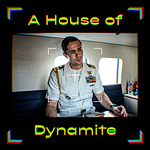Van and Lyle are joined by scholar-organizer Tobita Chow as they take on Akira Kurosawa’s classic adaptation of King Lear. They dig into the film’s depiction of friendly fire, not just as cinematic spectacle, but as a stark commentary on the self-defeating logic of war. They also follow Hidetora’s descent from absolute ruler to ghost-like shell, wandering through the desolation of his past crimes.
“In a mad world,” says the Shakespearean fool, “only the mad are sane.” Madness may initially protect the fallen king, but seeing the truth for the first time comes to haunt. Hidetora is confronted by a hermit boy once orphaned and blinded at the master’s command. The erstwhile victim now plays an accusatory, soul-indicting flute to his victimizer. The monarch manqué goes on to collapse in the ruins of a castle he once destroyed, proclaiming the man-made wasteland his private “hell.”
Yet Hidetora’s ultimate collapse only arrives after his most loyal son is killed escorting his father on horseback. In the fool’s final telling, the gods have seen men killing each other since the very beginning. Men worship murder, not peace. Domination, not solidarity. And so the gods (along with Kurosawa, perhaps) have given us—once again—what we want.
Further Reading
“Kurosawa’s Ran (1986) and King Lear: Towards a Conversation on Historical Responsibility,” by Joan Pong Linton
Kurosawa: Film Studies and Japanese Cinema, by Mitsuhiro Yoshimoto













